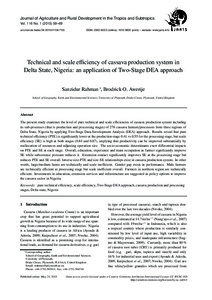| dc.date.accessioned | 2015-06-10T12:19:48Z | |
| dc.date.available | 2015-06-10T12:19:48Z | |
| dc.date.issued | 2015-05-21 | |
| dc.identifier.issn | 1612-9830 | |
| dc.identifier.issn | 2363-6033 | |
| dc.identifier.uri | urn:nbn:de:hebis:34-2015011347155 | |
| dc.identifier.uri | http://hdl.handle.net/123456789/2015011347155 | |
| dc.language.iso | eng | |
| dc.publisher | Kassel University Press | ger |
| dc.rights | Urheberrechtlich geschützt | |
| dc.rights.uri | https://rightsstatements.org/page/InC/1.0/ | |
| dc.subject | pure technical efficiency | ger |
| dc.subject | scale efficiency | ger |
| dc.subject | Two-Stage DEA approach | ger |
| dc.subject | cassava production and processing stages | ger |
| dc.subject | Delta state | ger |
| dc.subject | Nigeria | ger |
| dc.subject.ddc | 630 | |
| dc.title | Technical and scale efficiency of cassava production system in Delta State, Nigeria: an application of Two-Stage DEA approach | ger |
| dc.type | Aufsatz | |
| dcterms.abstract | The present study examines the level of pure technical and scale efficiencies of cassava production system including its sub-processes (that is production and processing stages) of 278 cassava farmers/processors from three regions of Delta State, Nigeria by applying Two-Stage Data Envelopment Analysis (DEA) approach. Results reveal that pure technical efficiency (PTE) is significantly lower at the production stage 0.41 vs 0.55 for the processing stage, but scale efficiency (SE) is high at both stages (0.84 and 0.87), implying that productivity can be improved substantially by reallocation of resources and adjusting operation size. The socio-economic determinants exert differential impacts on PTE and SE at each stage. Overall, education, experience and main occupation as farmer significantly improve SE while subsistence pressure reduces it. Extension contact significantly improves SE at the processing stage but reduces PTE and SE overall. Inverse size-PTE and size-SE relationships exist in cassava production system. In other words, large/medium farms are technically and scale inefficient. Gender gap exists in performance. Male farmers are technically efficient at processing stage but scale inefficient overall. Farmers in northern region are technically efficient. Investments in education, extension services and infrastructure are suggested as policy options to improve the cassava sector in Nigeria. | ger |
| dcterms.accessRights | open access | |
| dcterms.bibliographicCitation | In: Journal of Agriculture and Rural Development in the Tropics and Subtropics. Kassel : Kassel University Press. - Vol. 116, No. 1 (2015), S. 59-69 | |
| dcterms.creator | Rahman, Sanzidur | |
| dcterms.creator | Awerije, Brodrick Ohiyancho | |
| dc.description.everything | Gedruckte Ausg. im Verlag Kassel Univ. Press (www.upress.uni-kassel.de) erschienen. | ger |

